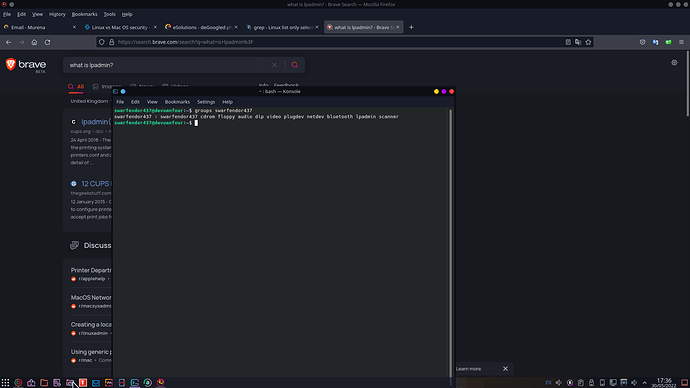No. I did not at any time ever say that Linux is not secure. You cannot quote me as saying that - so your claim of a contradiction has no merit. There is no contradiction.
What I have said is that there is No Possible Operating System that is 100% secure. And in making points, we can point out vulnerabilities in any operating system without claiming that it must, therefor, be an insecure system.
I say that defining the terms in security is essential in order to justify claims of Security.
I point out that anything can be claimed as "insecure" or "vulnerable", since there are no absolutes.
And I finalize with that Linux is secure for the average user. It is simply - Secure enough to be considered safe. There is no perfect Security and there are no absolutes - so no one can feel 100% confident that they are safe and secure. But this does not mean that they cannot feel confident and secure. Since it is not perfect and cannot be perfect, users can augment the security of Linux or Mac OS or Windows by
- Browsing wisely
- Doing research
- Using available tools like UFW
- Avoiding clicking things without ensuring you know the results of clicking it.
This is because the present vulnerabilities in any operating system are less threat to most average users than their own mistakes are.
To add clarity so as not to confuse again - I offer this perspective:
Do you have 100% confidence and security in knowing you will not be struck by lightning tomorrow? No. It is within the realm of possibility that could happen.
But this does not mean that you are not confident and secure enough to leave your home tomorrow and run errands and go to work... because you are plenty secure enough to believe you are highly likely to not be hit by lightning.
Is Linux Desktop as secure as Server - while I could argue it isn't, it would not matter. Because Desktop needs different security. Not an insult but... the average user simply is not a target for exploiting a vulnerability that if it exists, would yield only one data point. An attacker looks for the Millions, not the one.
This is the argument of obscurity and I addressed it here:
I agree that malware and risks exist for Linux. So, be mindful of what things you click on webpages.
I do not agree with this statement.
What you are saying is that MacOS has only bugs that can lead to vulnerabilities and the Linux has vulnerabilities that are inherent in the system and cannot be patched.
I already rebutted and refuted this claim here:
It's a misleading Red Herring to claim that "Linux is less secure because X11 doesn't isolate such and such..." because that fallacy ignores, utterly, that X11 relies on other security features included and inherent in the Complete Distro.
Your other point that MacOS lacks any inherent system vulnerabilities can be examined carefully against the vulnerabilities of "shrootless" or "powerdir" that allow user access in exactly the same way that access could be granted through X11- at least it could be granted if sudoers weren't involved... But it is. On Linux.
You can call any of those vulnerabilities a bug just as easily as any other. That fallacy is misleading.
And "powedir" is far more problematic than X11 isolation, considering that patching X11 is not really necessary due to redundant security in Linux.
Whereas in Mac, it needed a patch (not a fix because a fix cannot just be made) due to a higher threat level it introduces. Which is exactly what you claim is not a flaw in MacOS but is in Linux - you can see clearly here that it is the very flaw in MacOS that you claim is only in Linux.
This argument becomes less about facts and more about Spin. How to present the data in such a way as to lead the reader to a conclusion.
It's called "Misdirection."
I agree with this statement. However, I can point out (again) that the proprietary nature also allows more control (For Apple, not for the user) over what the user can do. This helps their security, even if it frustrates the Mac User.
No. But you just gave another Red Herring.
I pointed out that comparing apples to oranges will get you nowhere.
Throwing a red herring in with the apples and the oranges will change nothing.
What I said was CLEAR:
You need to clearly define what security you are referring to before you can make any meaningful claim as to whether MacOS is "more" secure than Linux because I could easily give examples that make it seem Linux is more secure or Mac is more secure, depending on how you apply it.
That is just Spin and I am not about Spin. Just The Facts.
Are you ....
really...
Claiming now that Windows is equally secure as Linux?
![]()
Really?
![]()
This is a bold claim.


